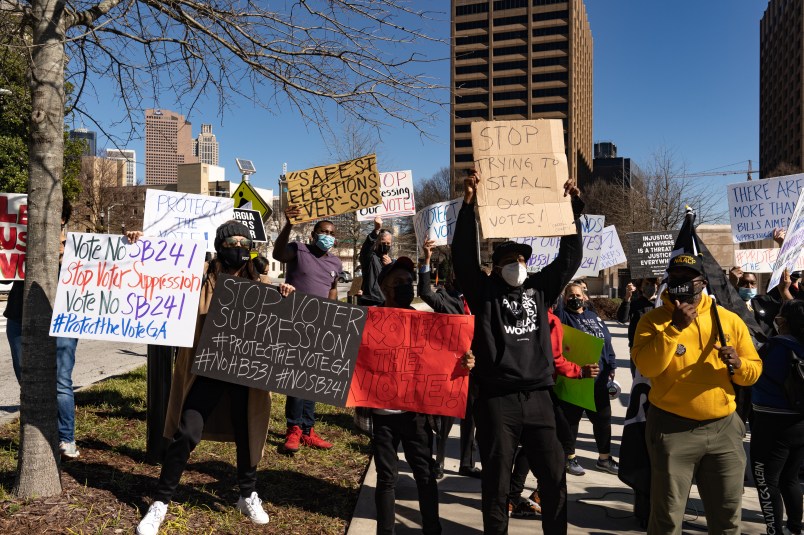After an initial wave of lukewarm PR-speak about new, restrictive voting measures in Georgia, major companies with a foothold in the state now seem all too eager to avoid political controversy.
Georgia’s corporate giants have dutifully released statements about the new law — which adds restrictions to voting by mail, state and local elections boards and, yes, giving food and water to people waiting in line to vote.
But none has gone as far as even the Major League Baseball player’s union, which on Friday signaled openness to having discussions with the MLB about relocating its All Star Game, which is scheduled to take place at Truist Park in Atlanta on July 13.
Atlanta-based Coca Cola, for example, said before the bill’s passage that “voting is a foundational right in America, and we will continue to work to advance voting rights and access in Georgia and across the country.”
After the bill passed last week, the company said only that it had been involved in the legislative session and had expressed concerns through the Metro Atlanta Chamber of Commerce.
“We, along with our business coalition partners, sought improvements that would enhance accessibility, maximize voter participation, maintain election integrity and serve all Georgians,” the company said. “We will continue to identify opportunities for engagement and strive for improvements aimed at promoting and protecting the right to vote in our home state and elsewhere.”
Other Georgia corporations under the microscope aren’t rushing to condemn the bill. And companies that have spoken out have claimed their lobbying efforts prevented the legislation from being even worse. For example, Republicans initially expressed support for eliminating no-excuse absentee voting and automatic voter registration, two measures that ultimately didn’t make it into the law.
The CEO of Delta, which has been bombarded with criticism, said in a statement on Friday that “Over the past several weeks, Delta engaged extensively with state elected officials in both parties to express our strong view that Georgia must have a fair and secure election process, with broad voter participation and equal access to the polls.”
“The legislation signed this week improved considerably during the legislative process,” the statement added, pointing to language about weekend voting and poll workers being allowed to work across state lines, among other things.
“Nonetheless, we understand concerns remain over other provisions in the legislation, and there continues to be work ahead in this important effort,” Bastian said.
The insurance company Aflac, headquartered in Columbus, said in a statement released prior to the voting law’s passage that it “will remain actively involved in the process to influence positive results that are aligned with Aflac’s long history of supporting fairness and justice.”
“Aflac will not support legislation that fails to accomplish these goals,” the statement added.
The company, like many of its peers, still hasn’t said whether it actually supported the finished product that Gov. Brian Kemp (R) signed into law Thursday.
“We remain committed to our previously stated principles that voting should be easy, accessible, secure and transparent,” a company spokesperson told TPM in a statement on Monday. “We have been engaged in the process and will continue to be actively involved to ensure that every eligible Georgian can exercise their right to vote, which is the cornerstone of our democracy.”
For voting rights advocates, the corporate response simply isn’t enough.
On Thursday, shortly before the bill was passed by the legislature and signed into law, Bishop Reginald Jackson of Sixth Episcopal District of the African Methodist Episcopal Church recalled Coca Cola CEO James Quincey’s past support for the Black Lives Matter movement.
“Now, when they try to pass this racist legislation, we can’t get him to say anything,” Jackson said in a speech. “And our position is, if you can’t stand with us now, you don’t need our money, you don’t need our support.”
Bishop Reginald Jackson announces a boycott of @CocaCola, which he said hasn’t come out strongly enough against proposed voting restrictions: “We’re not going to stand with folk who don’t stand with us.” #gapol pic.twitter.com/1mne4Y3r1z
— Greg Bluestein (@bluestein) March 25, 2021
Jackson said the same message applied to other major corporations in Georgia, including Delta Airlines and Home Depot: “We’re not going to give our money to folks who can’t stand with us.”
And on Monday, Stacey Abrams’ group, Fair Fight, said corporations “stood by” as state Republicans pushed the bill forward.
Georgia corporations stood by as statehouse Rs:
*Criminalized giving a voter a bottle of water
*Seized power from state, local election authorities
*Allowed mass, racist voter challenges
*Threw out eligible votes
*Acted on lies of insurrectionistsSilence is complicity. #gapol
— Fair Fight (@fairfightaction) March 29, 2021
This post has been updated.







Operative word here is “lukewarm” – they aren’t really against it, at least until they get enough pressure to actually be against it.
The one phrase I picked up immediately when we moved from SoCal to Lincoln, NE: “Could be worse.”
Yup that’s right, hit the fuckers where it hurts, cancel them, boycott their products whatever it takes.
Vote with dollars. Call them out on their racism.
My Unified Field theory of Georgia politics has basically been “The Money Party is the ruling party, D or R”.
Just now, the Rs have, panicked by tRump, and his hold over a party driven mad by Q and racist fear, ignored the Big Money in a desperate appearing bid to manipulate the election rules.
Watch House Speaker David Ralston: in the past he’s kept items like anti LGBTQ bills from passing as the Money guys had more sway than the Religious Right. His rolling with this complex set of changes tell me he’s terrified.
It’s going to be a long haul, but these awful attempts at keeping voters away can be overcome.
And we shall Overcome.